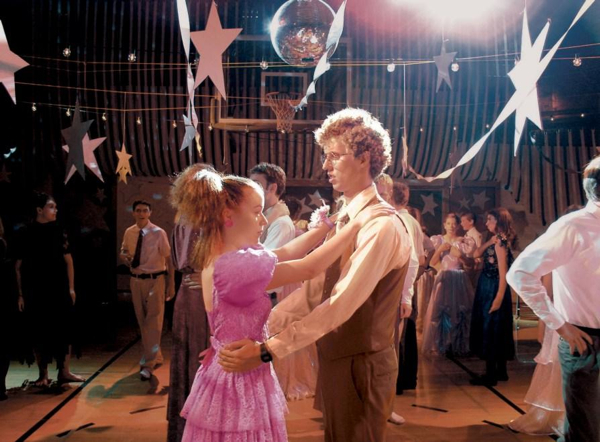Movie review by Greg Carlson
A thoroughly disjointed collection of weird sketches and odd circumstances revolving around a superbly awkward teenager navigating high school hell, “Napoleon Dynamite” bursts with a remarkable gift for observational detail. Already drawing frequent comparisons to Todd Solondz (accurate) and Wes Anderson (not so accurate), first time feature director Jared Hess follows in the footsteps of filmmakers who ferociously document elements of their own experiences in ways that allow everyone to recognize something eerily familiar. Freshening up the archetypal isn’t exactly easy, and Hess does not always succeed with “Dynamite,” but the movie is so unique that its quirky universe has a way of sticking with you for weeks at a time.
Jon Heder plays the title character, and his performance is as terrific as it is creepy. With his tight-fitting thrift store t-shirts, jeans, and moon boots, Napoleon seems to instinctively sense that clothes can indeed make the manchild. Given to machine-gun outbursts of fatuous lies (he claims to have spent his summer vacation hunting wolverines in Alaska) and jerky, sudden movements, Napoleon endures the cultural vacuum of rural Idaho (although the movie could be set in darn near any small town) with a sort of stoic optimism. Even though his pencil drawings indicate that he has no eye for depth, perspective, or line, Napoleon is sure that his renderings of unicorns, warriors, and attractive classmates will be recognized as amazing by those lucky enough to see them.
When Napoleon’s very active grandmother does something unfortunate to her coccyx (to borrow a line from Steve Coogan), she sends sleazy Uncle Rico (Jon Gries) to babysit, even though Napoleon’s brother Kip (Aaron Ruell, stealing scene after scene) also lives at home and is 32 years old. Even though the movie feels like it is set in the mid 1980s, Kip constantly scours online chatrooms in search of a soul mate. He gives up his seat behind the monitor just long enough to embark on some door-to-door food container salesmanship with Rico. Napoleon resents the team-up, and tries to raise some money of his own by taking a job at a poultry farm. Needless to say, it doesn’t exactly work out.
At school, Napoleon bonds with new kid Pedro (Efren Ramirez) and the shy Deb (Tina Majorino). Before you know it, Pedro has mounted a campaign to run for class president, and Napoleon eagerly accepts the management position, with the idea that he could eventually be in charge of security in the event Pedro wins the election. The depths of Napoleon’s ineptitude are bottomless – a poster-hanging montage set to the theme song from “The A-Team” is hilarious – but Hess always finds a way to make you believe that even the wildest dreams can come true at the most unexpected moments. The director probably should have skipped shooting the bonus ending that was attached to prints when the film earned a wider release, but stay all the way through the end credits to see what could just as well be the contents of Napoleon’s rich fantasy life.
“Napoleon” works as a fractured fairy tale, even though Hess fails to satisfactorily negotiate the fine line between laughing at and laughing with the characters. The movie’s resolution also sneaks up too fast, and without the proper prelude. The whole last act is tremendously funny, but would Napoleon’s otherworldly dance routine really trigger the admiration of his classmates? Hess finds a few exhilarating moments that really indicate his strong sense of visual storytelling, such as Kip’s exit and Napoleon’s tetherball game with Deb, but the script (which Hess wrote with his wife Jerusha Hess) leaves you wanting just a little bit more.
